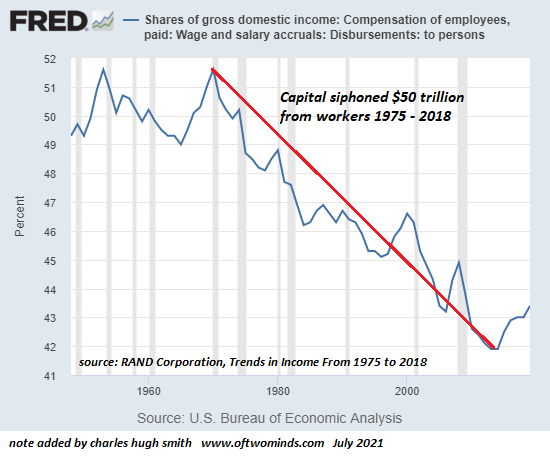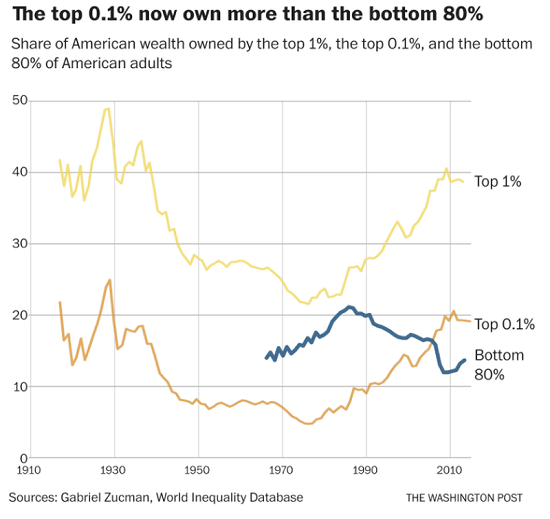Of Two Minds – The Cost of Financialization-Globalization: You Lost $500,000 and Gained $137.13
February 11, 2022
Ponder what a clawback of the $50 trillion might entail, and the immense benefits of returning to producing
quality goods and services by completely unwinding financialization and globalization.
The happy story that’s been ceaselessly promoted for 45 years is that financialization and globalization have
been wunnerful for all of us, boosting wealth and saving a small fortune as the cost of products fell.
This is a remarkable distortion of reality. The fact is your household lost $500,000 in earnings and
gained essentially nothing in supposed “cost savings.” The facts are presented in a study by the RAND Corporation:
Trends in Income From 1975 to 2018
$50 trillion in earnings has been transferred to the Financial Aristocracy from the bottom 90% of American households
over the past 45 years..
B-b-but wait, didn’t we all save a fortune on cheap jeans and TVs? No, you lost on that, too, as every product
was crapified by globalization. I discussed the uncounted losses of the U.S. economy being crapified in my
post
The “Crapification” of the U.S. Economy Is Now Complete.
Let’s start by defining financialization and globalization. Financialization is the reaping of profits
not by creating value by producing goods and services but by exploiting credit and leverage to reap unearned profits.
Here are two examples. Borrow $1 billion and then use this to do a leveraged buyout (LBO) of a $10 billion
company. Break the company’s divisions into separate companies and sell them off or take them public via
an IPO (initial public offering). Make $10 billion in pure profit from breaking up a company and selling its pieces,
all from $1 billion in borrowed money. Note that this LBO didn’t generate any gains in productivity or any new
goods and services, nor did it create any new jobs. All it did was greatly enrich a few financiers and Wall Street banks.
Here’s another example. Borrow $1 billion and use the money to buy back the shares of the corporation. The
market value of the company’s shares rise from $10 billion to $15 billion. The top management exercises its immense
hoard of stock options and skims billions of dollars in profits. Note that this stock buyback didn’t generate any
gains in productivity or any new goods and services, nor did it create any new jobs. All it did was greatly enrich
a few at the top of the heap.
This is the financialization of the U.S. economy in a nutshell. Financial games using other people’s money
and leverage make the big money, producing goods and services that create jobs is for losers.
Globalization is the process of moving production of goods and services overseas to reap the gains of cheap labor,
no environmental standards, corrupt politicians and the crapification of goods and services. Globalization
is the process of exposing much of America’s labor force to 1 billion new workers who will work for next to nothing
since they have no other means of earning cash.
Developing nations have limited means to enforce environmental regulations, so they are the convenient and cheap
dumping grounds for global corporations maximizing profits by dumping toxic waste in landfills, rivers, etc. Should
there be any spot of bother, comparatively low-cost bribes and payoffs to corrupt leaders insure the labor and land
will continue to be exploited without any problems with labor unions, environmental standards, etc.
Globalization also means making the product look nice but strip out all quality as needless expense.
Thin the paint so the steel rusts out in months, use the shoddiest materials so the veneer peels off, the screws
snap, the commodity chip fails, taking the mother board and entire appliance down with it, and so on, in an endless
and oh-so-profitable parade of crapification.
Well-paid shills tally up all the “savings” generated by crapification but they never look at the immense losses
in utility and durability. An appliance that cost $500 and lasted 20 years without any repair is far less
expensive over the 20 year lifespan than a $400 appliance that fails in 4 years and can’t be repaired, or the repair
costs almost as much as a new appliance. The hapless consumer of crapified goods ends up paying $2,500 over the
20 years for poorly made junk that falls apart in a few years or mysteriously fails as cheap electronic components
blink off.
In other words, I was being extremely charitable in granting $137.13 gains to each household in 45 years of
globalization–in reality, each household lost thousands of dollars in utility and durability. No wealthy
financier funds research into how much each American household lost in utility and durability because the financiers
who fund their philanthro-capitalist foundations all made their fortunes by stripmining financialization
and / or crapifying goods and services and
establishing monopolies and cartels to exterminate any competition. (Cough, Gates Foundation, cough.)
The well-paid shills tout the $100 savings but ignore the $2,000 in costs added by the collapse of quality and
durability. Who makes out when consumers have to buy five appliances over 20 years instead of one?
The shareholders of the financialized, globalized corporation, that’s who. And since the top 10% of
households own roughly 90% of all corporate shares and bonds (and the top 0.1% own 40%), the gains are highly
concentrated in the top, as the graphics below show.
If the labor force had retained its 1975 share of the economy’s income, each household would have $500,000 more
in income than they ended up with in the fully financialized, globalized, crapified economy we’re stuck with.
Let’s do the math: $50 trillion divided by 100 million households (the bottom 90% of households) is $500,000.
Divide $500,000 by 45 years and that’s $11,110 a year for 45 years.
We can quibble about inflation and purchasing power and so on, but however you reckon it, $500,000 stripped from
every household is a lot of money when we’re talking about 100 million households.
Next time you’re on hold with a crapified Corporate America or government service, and the next time your
globalized, crapified device fails, ponder all the costs of financialization and globalization that have yet to
be tallied. Ponder what a clawback of the $50 trillion might entail, and the immense benefits of returning to producing
quality goods and services by completely unwinding financialization and globalization.
We could completely unwind financialization and globalization if we chose to. I explain how in my new book
Global Crisis, National Renewal: A (Revolutionary) Grand Strategy for the United States.




My new book is now available at a 20% discount this month:
Global Crisis, National Renewal: A (Revolutionary) Grand Strategy for the United States (Kindle $8.95, print $20)
If you found value in this content, please join me in seeking solutions by
becoming
a $1/month patron of my work via patreon.com.
Recent Videos/Podcasts:
Charles Hugh Smith on Why Many are Resigning From Their Jobs (35 minutes, with Richard Bonugli)
My recent books:
Global Crisis, National Renewal: A (Revolutionary) Grand Strategy for the United States
(Kindle $9.95, print $25)
Read Chapter One for free (PDF).
A Hacker’s Teleology: Sharing the Wealth of Our Shrinking Planet
(Kindle $8.95, print $20,
audiobook $17.46)
Read the first section for free (PDF).
Will You Be Richer or Poorer?: Profit, Power, and AI in a Traumatized World
(Kindle $5, print $10, audiobook)
Read the first section for free (PDF).
Pathfinding our Destiny: Preventing the Final Fall of Our Democratic Republic
($5 Kindle, $10 print, (
audiobook):
Read the first section for free (PDF).
The Adventures of the Consulting Philosopher: The Disappearance of Drake
$1.29 Kindle, $8.95 print);
read the first chapters
for free (PDF)
Money and Work Unchained $6.95 Kindle, $15 print)
Read the first section for free
Become
a $1/month patron of my work via patreon.com.
NOTE: Contributions/subscriptions are acknowledged in the order received. Your name and email
remain confidential and will not be given to any other individual, company or agency.
|
Thank you, Colin G. ($50), for your marvelously generous contribution |
Thank you, Jose S. ($200), for your beyond-outrageously generous contribution |
|
|
Thank you, Russ T. ($5/month), for your magnificently generous pledge |
Thank you, Jerome T. ($10/month), for your monumentally generous pledge |
|
|
[ad_2]
Source link



